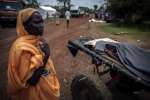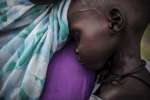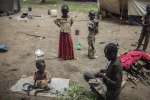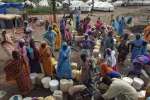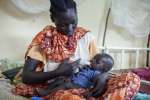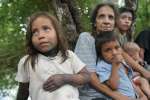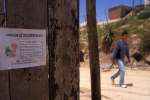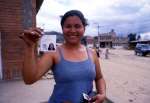- Text size
 |
|  |
|  |
| 
- Français
World AIDS Day: Love helps Colombian couple overcome discrimination
News Stories, 2 December 2011
CÚCUTA, Colombia, December 1 (UNHCR) – When Ana* was diagnosed as HIV-positive five years ago, she expected sympathy and help from the local community. Instead, she was hounded out of her village in a rural area of Colombia's Norte de Santander department.
"Wanted" posters were stuck up in hospitals and other public buildings, while the local radio station ran announcements that she was a "sidosa," or person living with HIV, and definitely not welcome. Flyers calling on the public to report her whereabouts were distributed around the town. Ana said one man threatened her and "said I was only good for being shot in the head."
Due to the persecution and growing threats, the pregnant Ana fled to the provincial capital, Cúcuta, where she gave birth to a healthy boy, Juan Pablo.* "I was afraid they would stop the ambulance and kill me. I arrived at the hospital alone, my sister had left. I sat down in a green plastic chair, with nothing, speechless, crying," she recalled.
The 35-year-old later moved with the newborn and her six-year-old daughter to a shelter run by the HOASIS Foundation for people living with HIV/AIDS. The UN refugee agency supports the project and has funded a hall and children's playground as part of a policy to ease the integration of this vulnerable group.
Ana's case is one example of how much still has to be done to spread awareness about HIV/AIDS, especially in backward, rural areas, and to remove the stigma, discrimination and persecution still suffered by many of the 34 million people estimated to be living with HIV today. According to the Colombian Network of HIV/AIDS-positive People, or RECOLVI, 27 per cent of those registered with HIV/AIDS have at least once been refused medical treatment.
UN High Commissioner for Refugees António Guterres on Thursday, World AIDS Day, said the agency needed to "redouble our advocacy efforts and collaboration with governments to ensure that refugees and other persons of concern are included in country HIV programmes and their rights to access HIV services, treatment, care and support are safeguarded. Our protection efforts must ensure that they are not discriminated against or stigmatized for being HIV positive, and can access existing social protection benefits."
Ana continued to face stigmatization after fleeing her village, including once when she tried to return. But she has also encountered understanding and love, starting with the HOASIS shelter, where she met her partner Eduardo,* who was a volunteer at the centre. "To be honest, I first fell in love with Juan Pablo [who was born HIV-negative] and then with Ana. It didn't make any difference that she had HIV, I don't care," he told UNHCR.
Ana thought it would be okay to spend their first Christmas together in her hometown, but soon found out that nothing had changed. After being threatened, they spent a harrowing night waiting for the early morning bus. "I was so afraid because I had never experienced something like that," Eduardo said.
With a suitcase, some clothes and 100,000 Colombian pesos (US$50), Ana, Eduardo and the two children started a new life in a different town. Eduardo was employed as a construction worker, earning enough to rent an apartment. But word of Ana's condition eventually leaked out and they moved back to Cúcuta.
Eduardo was able to get his job back at the HOASIS shelter, but felt bitter about the way they had been treated. They were considering legal action to get compensation. "Juan Pablo´s future cannot depend on crumbs," Eduardo said.
The family has never faced discrimination in Cúcuta, but they are painfully aware of the obstacles that face people living with HIV in conservative, largely illiterate communities – stigmatization and misinformation. This is mainly a rural problem but is also significant in urban areas in Colombia.
State institutions, particularly in the countryside, are ill-equipped to provide the proper services and assistance to people living with HIV, especially the forcibly displaced. UNHCR has been working to train government employees, including lawyers, public health workers and administrators, on the rights of people with HIV, who are protected from discrimination under the constitution.
UNHCR also seeks dialogue between civil society and the state to create processes to improve the quality of life of people with HIV/AIDS. Programmes are implemented to defend their rights and to avoid discrimination because of displacement, sexual orientation, gender or an HIV-positive diagnosis.
Nicolás Salazar, director of the Provida Foundation (a UNHCR partner), stressed that HIV infection should not destroy a person's life. "However difficult things may get, there is always something good to hope for," he said, adding that for him, "Ana and Eduardo represent pure love, a love that could overcome illness, displacement and poverty; a love that is noble because it saved these two lives."
*Names have been changed for protection reasons.
By Johanna Reina in Cúcuta, Colombia

